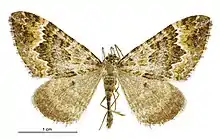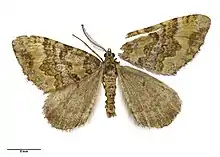| Asaphodes glaciata | |
|---|---|
 | |
| Male | |
| Scientific classification | |
| Domain: | Eukaryota |
| Kingdom: | Animalia |
| Phylum: | Arthropoda |
| Class: | Insecta |
| Order: | Lepidoptera |
| Family: | Geometridae |
| Genus: | Asaphodes |
| Species: | A. glaciata |
| Binomial name | |
| Asaphodes glaciata | |
| Synonyms[2] | |
| |
Asaphodes glaciata is a species of moth in the family Geometridae. This species is endemic to New Zealand. This moth has only be found in Westland in the areas near Fox and Franz Josef Glaciers. Adults of this species are on the wing in January.
Taxonomy
This species was described by George Hudson in 1925 as Xanthorhoe glaciata using material collected by Charles E. Clarke at Mount Moltke in Westland in January at 1700m.[2][3] Hudson also discussed and illustrated this species under this name in his 1928 publication The Butterflies and Moths of New Zealand.[4] In 1987 Robin C. Craw proposed assigning this species to the genus Asaphodes.[5] In 1988 John S. Dugdale agreed with this proposal.[2] The holotype specimen is held at the Auckland War Memorial Museum.[2]
Description
.jpg.webp)
Hudson described the species as follows:
The expansion of the wings is almost 1+1⁄4 inches. The forewings, which have costa strongly arched near the apex and the termen obliquely rounded, are bright yellow-ochreous with blackish-brown and bluish-white markings; a small bluish-white basal patch, heavily sprinkled with blackish scales; a pale yellowish-brown subbasal band edged with blackish-brown, with two deep rounded indentations above and below middle; centre of median band bluish-white, heavily sprinkled with blackish-brown scales; the outer edge of median band from 2⁄3 of costa to about 3⁄4 of dorsum, with a very strong rounded double protection slightly below the middle; outer portion of band composed of several wavy lines of blackish-brown scales; a large suffused crescentric patch of dull brown on termen below apex; a subterminal series of diffused bluish-white spots; an obscure terminal series of brown crescentric marks; cilia brownish-ochreous. The hindwings are pale brownish-ochreous, with a broad suffused greyish terminal band, and numerous fine broken greyish lines and dots on basal 2⁄3; a distinct grey discal dot; cilia dull ochreous-brown.[4]
Distribution

This species is endemic to New Zealand.[1][6] A. glaciata can only be found in Westland around the Fox and Franz Josef Glaciers.[7]
Biology and life cycle
A. glaciata is on the wing in January.[4]
References
- 1 2 "Asaphodes glaciata (Hudson, 1925)". www.nzor.org.nz. Landcare Research New Zealand Ltd. Retrieved 22 August 2018.
- 1 2 3 4 Dugdale, J. S. (1988). "Lepidoptera - annotated catalogue, and keys to family-group taxa" (PDF). Fauna of New Zealand. 14: 173. Archived from the original (PDF) on 27 January 2019. Retrieved 22 August 2018.
- ↑ Hudson, George Vernon (1925). "Descriptions of three new species of Lepidoptera from New Zealand". Entomologist's Monthly Magazine. 61: 220–221. Retrieved 23 August 2018.
- 1 2 3 Hudson, G. V. (1928). The Butterflies and Moths of New Zealand. Wellington: Ferguson & Osborn Ltd. p. 118. OCLC 25449322.
- ↑ Craw, R. C. (2 February 2012). "Revision of the genus Helastia sensu stricto with description of a new genus (Lepidoptera: Geometridae: Larentiinae)". New Zealand Journal of Zoology. 14 (2): 269–293. doi:10.1080/03014223.1987.10422997.
- ↑ Gordon, Dennis P., ed. (2010). New Zealand inventory of biodiversity: Kingdom animalia: chaetognatha, ecdysozoa, ichnofossils. Vol. 2. p. 459. ISBN 978-1-877257-93-3. OCLC 973607714. OL 25288394M. Wikidata Q45922947.
- ↑ Heads, Michael J. (2016). Biogeography and Evolution in New Zealand. Florida: CRC Press. ISBN 9781315368177. LCCN 2016010188.